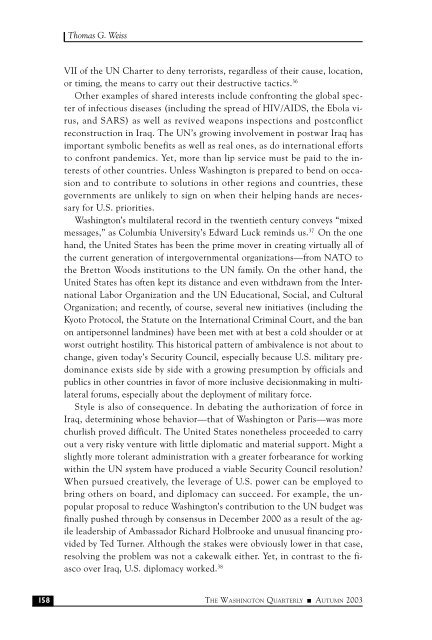The Illusion of UN Security Council Reform - United Nations ...
The Illusion of UN Security Council Reform - United Nations ...
The Illusion of UN Security Council Reform - United Nations ...
You also want an ePaper? Increase the reach of your titles
YUMPU automatically turns print PDFs into web optimized ePapers that Google loves.
158<br />
l Thomas G. Weiss<br />
VII <strong>of</strong> the <strong>UN</strong> Charter to deny terrorists, regardless <strong>of</strong> their cause, location,<br />
or timing, the means to carry out their destructive tactics. 36<br />
Other examples <strong>of</strong> shared interests include confronting the global specter<br />
<strong>of</strong> infectious diseases (including the spread <strong>of</strong> HIV/AIDS, the Ebola virus,<br />
and SARS) as well as revived weapons inspections and postconflict<br />
reconstruction in Iraq. <strong>The</strong> <strong>UN</strong>’s growing involvement in postwar Iraq has<br />
important symbolic benefits as well as real ones, as do international efforts<br />
to confront pandemics. Yet, more than lip service must be paid to the interests<br />
<strong>of</strong> other countries. Unless Washington is prepared to bend on occasion<br />
and to contribute to solutions in other regions and countries, these<br />
governments are unlikely to sign on when their helping hands are necessary<br />
for U.S. priorities.<br />
Washington’s multilateral record in the twentieth century conveys “mixed<br />
messages,” as Columbia University’s Edward Luck reminds us. 37 On the one<br />
hand, the <strong>United</strong> States has been the prime mover in creating virtually all <strong>of</strong><br />
the current generation <strong>of</strong> intergovernmental organizations—from NATO to<br />
the Bretton Woods institutions to the <strong>UN</strong> family. On the other hand, the<br />
<strong>United</strong> States has <strong>of</strong>ten kept its distance and even withdrawn from the International<br />
Labor Organization and the <strong>UN</strong> Educational, Social, and Cultural<br />
Organization; and recently, <strong>of</strong> course, several new initiatives (including the<br />
Kyoto Protocol, the Statute on the International Criminal Court, and the ban<br />
on antipersonnel landmines) have been met with at best a cold shoulder or at<br />
worst outright hostility. This historical pattern <strong>of</strong> ambivalence is not about to<br />
change, given today’s <strong>Security</strong> <strong>Council</strong>, especially because U.S. military predominance<br />
exists side by side with a growing presumption by <strong>of</strong>ficials and<br />
publics in other countries in favor <strong>of</strong> more inclusive decisionmaking in multilateral<br />
forums, especially about the deployment <strong>of</strong> military force.<br />
Style is also <strong>of</strong> consequence. In debating the authorization <strong>of</strong> force in<br />
Iraq, determining whose behavior—that <strong>of</strong> Washington or Paris—was more<br />
churlish proved difficult. <strong>The</strong> <strong>United</strong> States nonetheless proceeded to carry<br />
out a very risky venture with little diplomatic and material support. Might a<br />
slightly more tolerant administration with a greater forbearance for working<br />
within the <strong>UN</strong> system have produced a viable <strong>Security</strong> <strong>Council</strong> resolution?<br />
When pursued creatively, the leverage <strong>of</strong> U.S. power can be employed to<br />
bring others on board, and diplomacy can succeed. For example, the unpopular<br />
proposal to reduce Washington’s contribution to the <strong>UN</strong> budget was<br />
finally pushed through by consensus in December 2000 as a result <strong>of</strong> the agile<br />
leadership <strong>of</strong> Ambassador Richard Holbrooke and unusual financing provided<br />
by Ted Turner. Although the stakes were obviously lower in that case,<br />
resolving the problem was not a cakewalk either. Yet, in contrast to the fiasco<br />
over Iraq, U.S. diplomacy worked. 38<br />
THE WASHINGTON QUARTERLY ■ AUTUMN 2003


